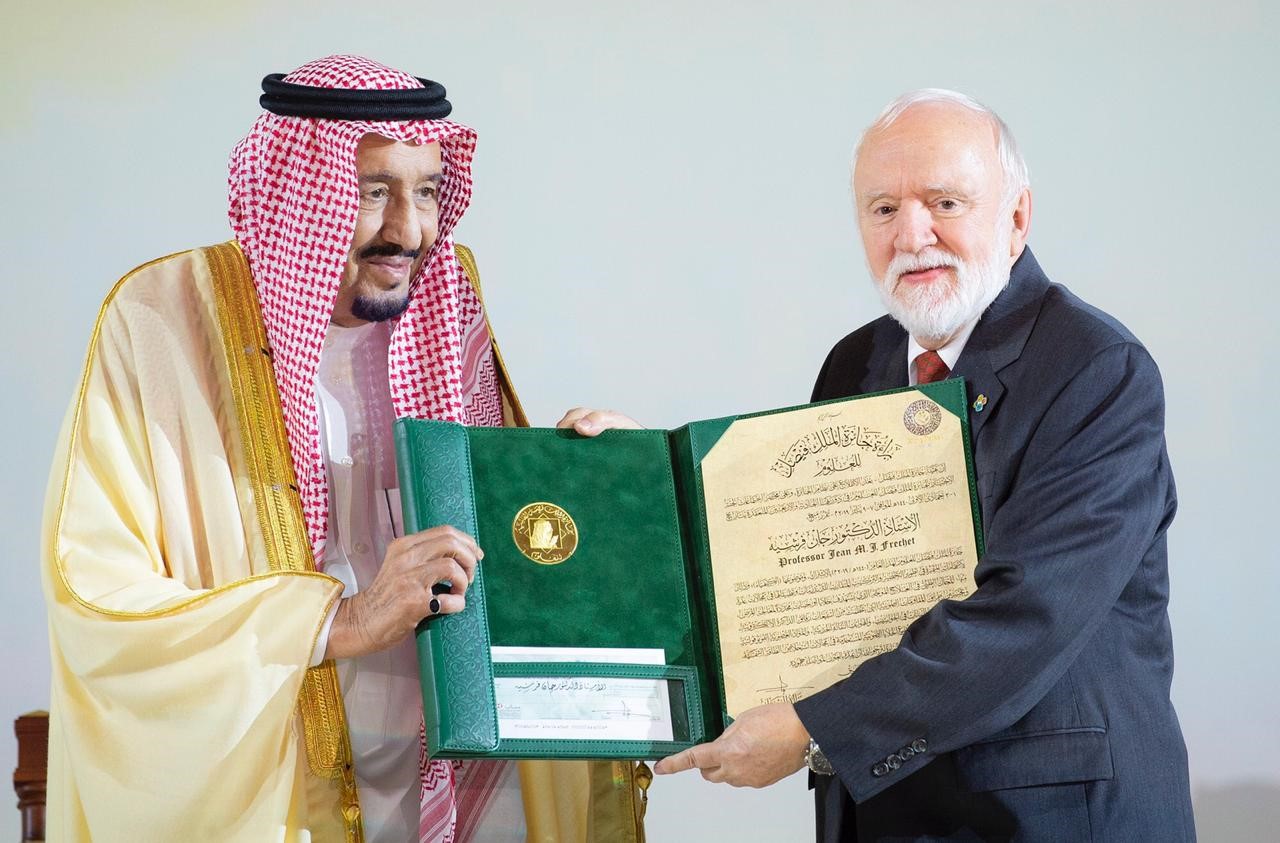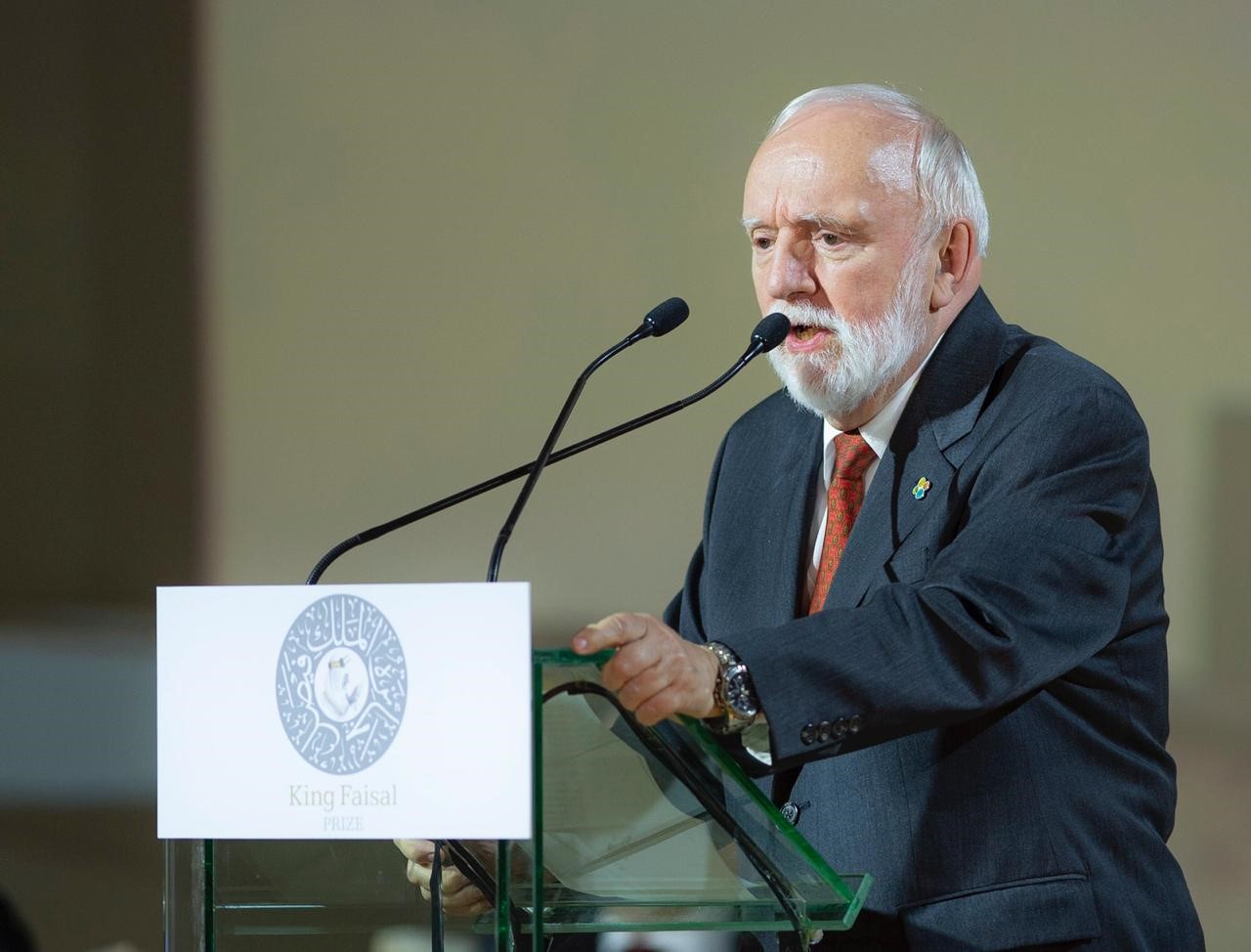King Salman presents 2019 King Faisal Prize in Science to KAUST Professor Jean M. J. Fréchet

Custodian of the Two Holy Mosques King Salman presents the 2019 King Faisal Prize in Science in the field of Chemistry to Professor Jean M. J. Fréchet, vice president emeritus and former senior vice president for Research, Innovation and Economic Development at KAUST, on March 24 in Riyadh. File photo.
Custodian of the Two Holy Mosques King Salman presented the 2019 King Faisal Prize in Science in the field of Chemistry to Professor Jean M. J. Fréchet, vice president emeritus and former senior vice president for Research, Innovation and Economic Development at KAUST, in a ceremony that took place in Riyadh on March 24.
The prize recognizes Fréchet's pioneering work and seminal contributions to chemical science, such as the convergent synthesis of dendrimers and their applications, chemically amplified photoresists and organic photovoltaics.
"This is a very special event to me—to be recognized in the Kingdom is something amazing," Fréchet said. "It is a special pleasure because I have had so many good years at KAUST and it of course brings back the past—the time when I did the research which is honored by this prize. I am confident that KAUST will prove to be an enormous asset for the Kingdom, rekindling the tradition of scientific excellence within Islamic lands and contributing to economic development and diversification of this great Kingdom."
The prestigious King Faisal Prize, launched by the King Faisal Foundation and granted for the first time in 1979, recognizes the outstanding work of individuals and institutions in five categories: service to Islam; Islamic studies; Arabic language and literature; medicine; and science. Since the establishment of the King Faisal Prize in 1976, 21 laureates have gone on to receive Nobel Prizes.

Professor Jean M. J. Fréchet, KAUST former senior vice president for Research, Innovation and Economic Development, speaks during the award ceremony for the 2019 King Faisal Prize in Riyadh on March 24. File photo.
One remarkable research breakthrough was Fréchet's design of a chemically amplified photoresist based on a single photochemical event that is amplified along a polymer chain. This elegant solution drove the revolution in the fabrication of ever-smaller microprocessors and memory chips that are now ubiquitous in consumer electronics. This was, as Professor George M. Whitesides of Harvard University said, "one of the most important discoveries of modern polymer chemistry and perhaps in modern chemistry—period. It is difficult to find a contribution from chemistry that has had more impact on the world as we know it."
Fréchet also introduced the convergent methodology, which allowed for the synthesis of dendrimers. This approach builds a macromolecule from the outside in, granting unparalleled control over the molecule's growth, structure and functionality. Fréchet's dendrimers have been used in myriad applications from catalytic nanoreactors to drug delivery systems. He later developed carrier macromolecules based on his dendrimers that can target specific organs before releasing their medicinal payload.
During his nine years at KAUST, Fréchet sought to understand the needs and potential of Saudi Arabia and aligned KAUST research to address those needs. He was a staunch advocate for developing Saudi youth and empowering female scientists and academic leaders. Although Fréchet retired from KAUST in January 2019, he remains active in the Kingdom as a member of the advisory board of NEOM, Saudi Arabia's gigaproject to build a sustainable city of the future.
The award is shared with the American chemist Allen Joseph Bard from The University of Texas at Austin.
Related stories:
- Retired KAUST SVP Jean M. J. Fréchet awarded prestigious King Faisal Prize in Chemistry
- Fréchet goes over 100K
- Professors Fréchet and Hauser elected NAI Fellows

